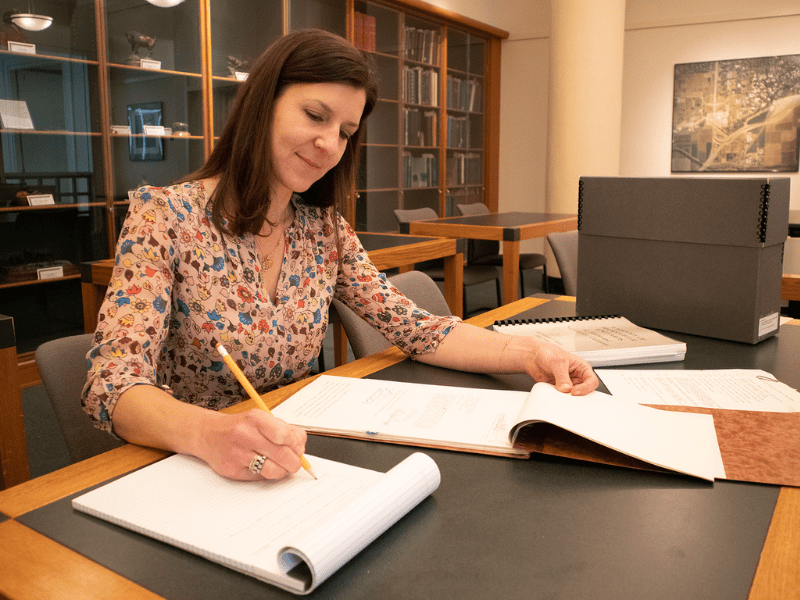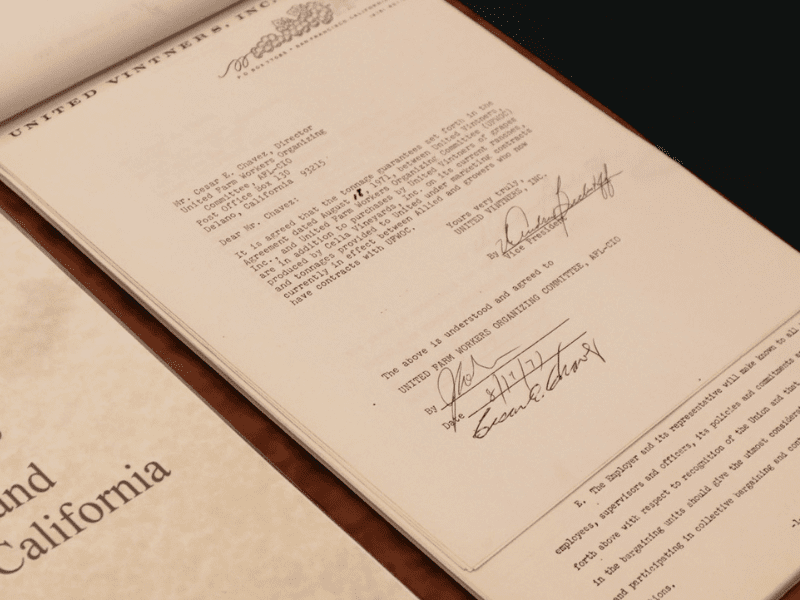Nationally Regarded Grape Grower W. Andrew “Andy” Beckstoffer Gifts Papers to UC Davis Library
Collection provides insider’s look into decades of business strategy in Napa Valley

W. Andrew “Andy” Beckstoffer, a prominent grape grower in the world-class Napa Valley wine region since the 1970s who has been called “the most powerful grower in Napa” by both the Wall Street Journal and Wine Spectator, recently gifted his professional papers to the UC Davis Library.
The Beckstoffer collection includes letters, notes, emails, transactional records and other papers that provide unique insight into the economic development of the Napa Valley at a pivotal time in its history from 1970 to today. Among the items are correspondence between Beckstoffer and labor leader and civil rights activist Cesar Chavez, and purchase agreements for Beckstoffer’s acquisition of To Kalon, which many consider the crown jewel of American viticulture.
Beckstoffer and his wife, Betty, also made a donation to the UC Davis Library to facilitate the cataloging and digitization of the collection. This donation will support the compilation of oral histories from Beckstoffer and others in the Napa Valley wine industry to contextualize the collection.
“Mr. Beckstoffer has played a pivotal role in the success of the Napa Valley and elevated the terroir and fruit of the region to be highly valued on an international scale,” said MacKenzie Smith, who recently retired after more than a decade as UC Davis University Librarian and Vice Provost of Digital Scholarship. “This collection will give researchers new insight into the story of the grower, which is a lesser known but important aspect of Napa Valley’s history, prestige and success,” she added.
Napa Valley’s most powerful grape grower
Often seen wearing weathered boots, jeans and a button-down collared shirt, Beckstoffer is both a farmer and businessman.
After earning his MBA at Dartmouth, Beckstoffer came to the Napa Valley in the late 1960s as part of his job in negotiating the purchase of Inglenook and Beaulieu Vineyards for food and beverage company Heublein, which produced hard alcohols like Smirnoff and Jose Cuervo.
In 1970, Beckstoffer established a vineyard management company for Heublein. In 1973, he bought that company from Heublein and started purchasing vineyards in Napa. Unlike other businesspeople at the time, Beckstoffer saw the untapped economic and quality potential of designating wine by the vineyard in which the grapes were grown in the Napa Valley. During that era, the price of grapes was based on commodity pricing — and Napa Valley grapes were priced the same as grapes grown elsewhere in Northern California despite soaring Napa Valley wine prices. Beckstoffer saw the need for change.
Improving the value of grapes and the land
Beckstoffer’s idea was that the price of grapes should be based on the price per bottle of the wines they produced instead of average commodity pricing. His pricing formula called for Napa Valley per-ton grape prices to be 100 times the retail price of the wine they produced. For example, grapes used to make a $250 a bottle of wine would sell for $25,000 a ton. Original documents pertaining to Beckstoffer’s pricing formula, as well as his negotiations with wineries to implement this pricing structure, are part of the UC Davis Library collection.
“That pricing structure totally changed the economic and political status of the grape grower and the profitability of vineyard ownership. It was controversial at first, but when you get down to it, it worked. And the fact that it did work means the Valley can be saved for agriculture because you can make money growing grapes,” Beckstoffer said. “Our success in making vineyards profitable, combined with the local Ag Preserve, saved Napa Valley.”

Implementing technology
Beckstoffer also made a conscious effort to integrate technology into the grape growing process on his vineyards. His work to increase yields through data analysis, water conservation and responsible farming are documented in the library’s collection. Many of these innovations, Beckstoffer said, were enabled through collaboration with UC Davis experts.
“In the early days, Dr. (Harold) Olmo would come, Dr. (Maynard) Amerine would come, and (Dr.) Andy Walker would all come to our vineyard,” he said. “We’ve been connected with UC Davis forever because Davis has always had the people who did the best viticulture research. Davis is known worldwide for its quality work.”
Valuing farm workers
In addition to advocating for the land in Napa Valley, Beckstoffer also worked to ensure the people who worked the land were valued.
“We demanded that growers have a seat at the table. We also said that farm workers are a part of the team,” he said. “In the 1970s, the vintner was the first-class citizen, the grower was a second-class citizen, and the worker was a third-class citizen. We said ‘no.’ We’re all part of the team.”
While at Heublein, Beckstoffer worked with Cesar Chavez as part of the Allied Grape Growers and United Farm Workers negotiations. Beckstoffer let Chavez review the Allied Growers contract without the approval of the Allied Grape Growers — a gesture that ameliorated negotiations that previously were at a standstill.
Beckstoffer recounts the meeting he had in a motel room in Palo Alto with Chavez, five farm workers, and “two of the biggest German Shepherds you’ve ever seen in your life” named Boycott and Huelga, meaning the cause (or strike).
“We negotiated. I wrote out on a sheet of paper the points of a deal to stop the boycott and we all signed it. I’ve given a copy to the UC Davis Library,” he said.

(UC Davis Library/Archives and Special Collections)
Honored to be part of the ‘Greatest wine library in the world’
Beckstoffer said he is honored to be a part of the UC Davis wine library, which has been called the greatest wine library in the world, and to have his collection coexist with prominent figures such as Jancis Robinson, Olmo and Amerine.
Beckstoffer hopes students and scholars alike can use his collection to understand not just his business strategies, but also gain a better appreciation for the Napa Valley.
“Someone’s going to ask, ‘how the hell did you take a little farming community in 1970 and make it a world-class viticulture area?’ If you want to research how the Napa Valley got saved — if you are really interested in that question — hopefully these papers will help you answer that from the grower side,” he said. “The wine quality is part of it, but it’s also the viticultural, business and promotional strategies, and getting us all to work as a team. That’s part of the story.”
Media Contact
- Jessica Nusbaum, UC Davis Library, 530-752-4145, jlnusbaum@ucdavis.edu
Media Resources
- Online press kit with images from the Beckstoffer collection
- Beckstoffer Vineyards
- UC Davis Library Archives and Special Collections
- UC Davis Library Food and Wine Collections